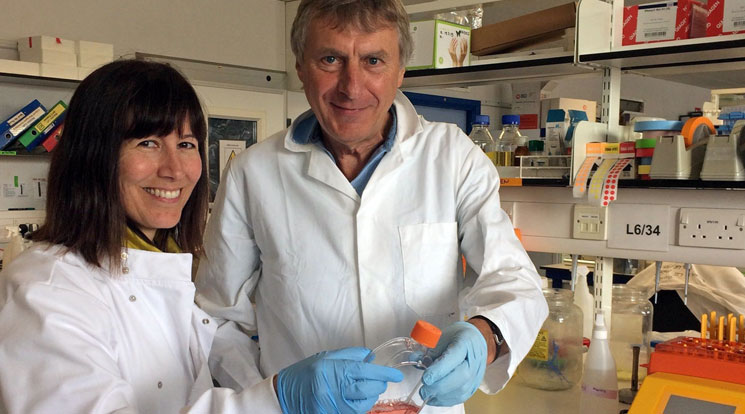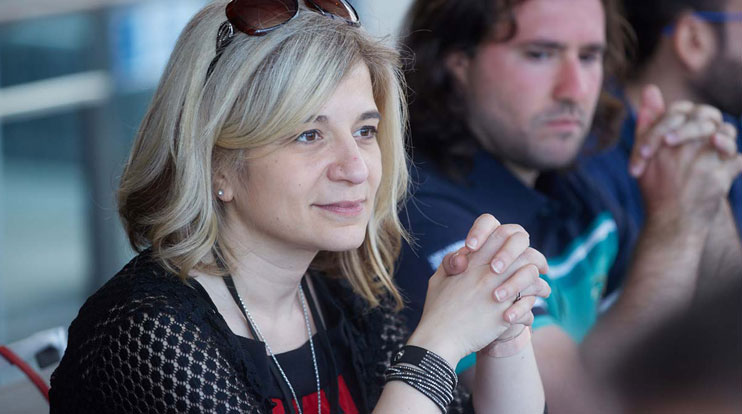

Photo credit: Stígur Már Karlsson/Heimsmyndir–Getty One
The Rainin Foundation provides early support for novel ideas that can lead to breakthroughs in IBD research.
A MESSAGE FROM OUR CEO
When we wrote our 2019 Turning Points, we reflected on a different world. Now, we are all confronted by the economic and social effects of a global pandemic and the many inequities it has exposed. As we grapple with immense challenges what has not changed for me is the need to listen. Listening to you will lead us to the best way forward. With you as our partners and co-creators, we can find our way together. Continue reading.
Investing To Improve Patient Outcomes
The Kenneth Rainin Foundation invests in novel ideas and collaborations to achieve breakthroughs in Inflammatory Bowel Disease (IBD) research. In 2019, we continued to advance our strategic emphasis on translational science, moving ideas and discoveries closer to patient impact. Our online IBD resource reflects the broad range of our investments—encompassing diet, the microbiome, new technologies and more. New initiatives address constraints on researchers, create inroads for gender equity and evaluate our impact.
“The Rainin Foundation is focused on equity and continues to address barriers that limit opportunity for women in science. Including diverse perspectives in biomedical research is crucial to achieving breakthroughs for patients and eradicating disease.”
—Loren Harris, Chief Program and Strategy Officer
BREAKTHROUGH MOMENTS
Mapping The Virome
Video credit: Lori Halloran
Dr. Kate Jeffrey is undaunted by vast expanses of uncharted territory. With her lab at Harvard Medical School and Massachusetts General Hospital, she has embarked on a new frontier to research the human virome. It holds promise for treatment breakthroughs for IBD.
Evaluating Our Impact
Understanding whether our funding is leading to the greatest possible impact for IBD patients is important to effective grantmaking. Evaluating impact is a particular challenge in funding discovery science. So, we’re excited that after extensive scoping and discussions with a working group of biomedical funders, we have a new tool in our grantmaking toolkit. ResearchFish is a data collection platform that is embraced by a global community of science research funders, research institutions and scientists.
The user-friendly design captures a comprehensive range of measures and indicators. Funders can gain insights through a set of common questions and customized ones. Researchers can store and report information on outcomes and outputs in one central place, which we hope will reduce their administrative burdens. The system streamlines reporting further by automatically harvesting grantee research products, including published research, citations and online “buzz” about articles. We will begin using ResearchFish in our 2020 progress reports. We look forward to deepening our understanding of our funding impact and enhancing our ability to share that more readily.
What The Data Can Tell Us
- Are projects moving toward direct interventions or clinical trials?
- Have projects attracted new and more significant funding?
- Were project findings published or cited in high-profile publications?
“We’re continually reminded of how hard it is to measure the impact of basic science—and we’re not alone. We’re excited to have a new tool to improve our evaluation of grant outcomes and impacts.”
—Laura Wilson, PhD, Director, Health Strategy & Ventures
ADVANCING PROMISING RESEARCH
Further Together
Video credit: Forward Ever Media
The Rainin Foundation is primed to advance bold ideas toward curing IBD. Watch this video to learn more about how we are leveraging our partnerships and responding to opportunities to improve patient outcomes.
Collaborating To Move The Field Forward
The Rainin Foundation believes in the power of partnerships to leverage diverse resources and achieve breakthroughs in IBD research. We champion collaboration among our grantees and the same holds true for us as a grantmaker. The cross-disciplinary insights of our Scientific Advisory Board strengthen our grantmaking and reinforce our commitment to advancing translational science.
We also collaborate to achieve greater impact. We co-hosted a scientific workshop with the Helmsley Charitable Trust to gather perspectives from experts about dietary interventions in IBD. Over the last year, we compiled an executive summary of our findings—“Evolving Research: Diet, the Microbiome and Inflammatory Bowel Disease.” It reviews the current state of dietary interventions and identifies gaps in our knowledge about the microbiome and dietary interventions. The summary offers a roadmap for future IBD and diet research, and how funders can support this emerging field.
Our Health team also partners with research institutions and biomedical funders in the Nonprofit Funder-Research Institute Working Group. The group is focused on addressing issues where a broad, collaborative response has the greatest potential for creating field-wide solutions. Issues include how to:
- Support indirect research costs
- Streamline processes to reduce administrative burdens for applicants and grantees
- Ease the contract negotiation process, in particular for intellectual property and royalty sharing terms
“It’s rewarding to collaborate with our peers. It can be hard work, but we know there’s greater potential to solve problems when we can bring diverse perspectives to the table and leverage our combined resources.”
—Laura Wilson, PhD, Director of Health Strategy and Ventures
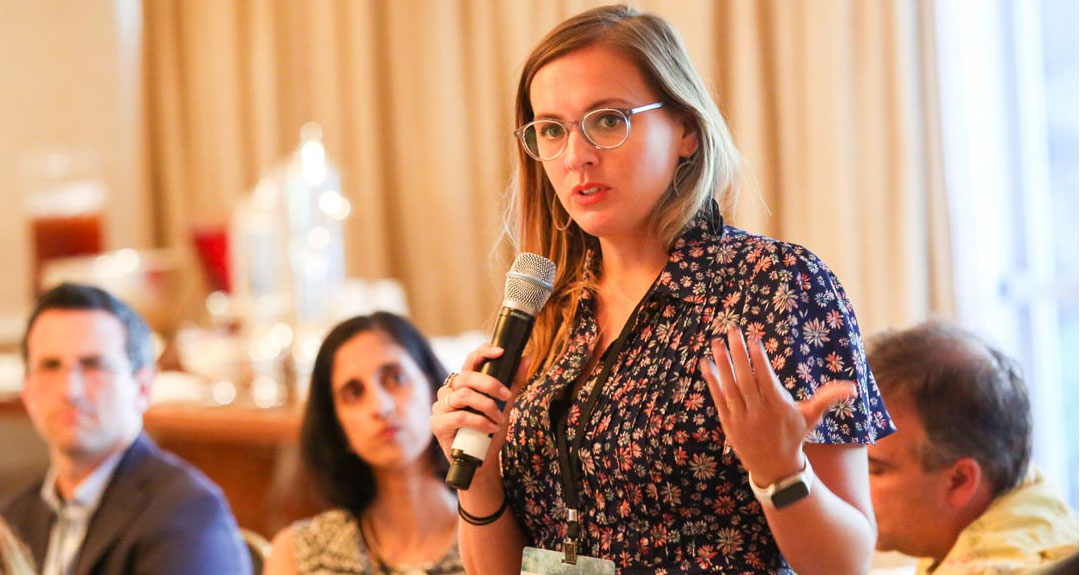
Photo credit: Robin Scanlon
Katie Alexander, PhD, University of Alabama, at the 2019 Innovations Symposium.
Catalyzing Innovation
Our 2019 Innovations Symposium in Hawaii offered a sun- and sand-enhanced destination for 140 attendees and their families. Each year, the event draws scientists, physician-scientists, clinicians, industry professionals and trainees—all eager to connect and share their research on IBD. Our eighth annual gathering featured distinguished field leaders as well as early-career scientists and included poster sessions by nearly 50 grantees.
We designed this symposium to build gender equity and to welcome families. Panels and presentations showcased diverse perspectives of both established and younger women researchers. Trailblazing scientists like Drs. Fiona Powrie, Bana Jabri and Yasmine Belkaid presented alongside a slate of other distinguished speakers. We also offered free onsite childcare for our speakers and grantees over the three-day event, which is a surprising unusual feature for a scientific conference. We augmented with that shorter conference days and a child-friendly reception.
“The Foundation’s efforts to ensure gender balance at the Symposium by having equal numbers of female and male speakers and providing childcare to attendees, are truly commendable. It should serve as an example for scientific conference organizers worldwide.”
—Shruti Naik, PhD, New York University School of Medicine
2019 INNOVATIONS SYMPOSIUM
Ensuring Diverse Perspectives
We promoted gender equity by increasing the number of female scientists who presented.
![]()
29%
Percentage of attendees who were early-career researchers.
Free onsite childcare, shorter conference days and a child-friendly reception helped more parent-researchers attend.
![]()
Resources To Advance Research
Investigators confront challenges beyond the intricacies of a complex disease like IBD. In response to needs expressed by our grantees at the Innovations Symposium, the Rainin Foundation created a new grant opportunity. Launched as a pilot in January 2020, our Networking Grants program is available to current grantees. Our support will enable them to secure additional resources, information and knowledge to advance their research.
Grant awards of up to $50,000 will provide access to materials, clinical expertise or tools that are otherwise unavailable to research teams. This might include tissue samples or access to more advanced technologies that can help refine and test novel ideas or translate their work to clinical settings. By increasing opportunities and resources for grantees’ research, the Rainin Foundation hopes to accelerate the discovery of new patient treatments. Piloting this program enables us to assess its effectiveness based on outcomes reported by grantees.
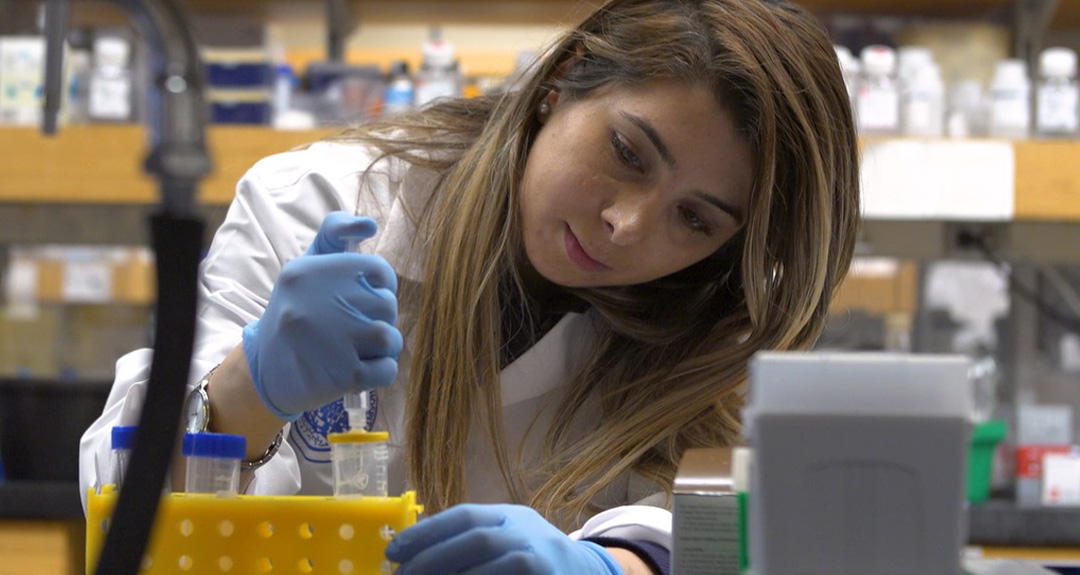
Photo credit: Lori Halloran
Postdoctoral fellow Fatemeh Adiliaghdam, MD, is identifying viruses in the gut at the Jeffrey Lab at Massachusetts General Hospital.
Investing In Trailblazers
Drawing on the same commitment that shaped our 2019 Innovations Symposium, the Rainin Foundation is embedding equity throughout our grantmaking. For the first time in our Health funding, half of our 2019 Innovator Awards support female investigators. These and other grantees are forging ahead—blazing trails in IBD research and publishing their findings in high-profile journals. Several maturing grants focused on emerging lines of inquiry in IBD research—previously overlooked associations now coming into prominence.
- Iliyan Iliev at Weill Medical College of Cornell University is building on his Innovator Award research to highlight the importance of fungal microbiota in IBD treatment. He’s collaborating with Inga Peter and Jean-Frédéric Colombel, both at Icahn School of Medicine at Mount Sinai, to explore the transference of gut fungi from mother to newborn, and the mycobiome in babies born to mothers with IBD.
- Jun Huh at the University of Massachusetts is also studying the maternal genetic transference of disease. His research looks at maternal inflammation during pregnancy as an environmental risk factor linking autism and IBD. He published research—co-authored with Kate Fitzgerald—into the mechanisms behind his observations about immune system and mind connectivity.
- Kate Jeffrey, Corinne Maurice, Irah King and Naama Geva-Zatorski comprise an international team connecting research institutions in three countries. Their project takes advantage of new technologies to identify viruses in the gut. Their research targets the potentially protective role of the intestinal virome in the context of health and IBD.
- Randy Longman and Iwijn De Vlaminck are combining their clinical and bioengineering expertise. They aim to develop a non-invasive blood test to assess Crohn’s disease severity without triggering a response in patients. It would guide therapeutic approaches and provide mechanistic insight into inflammation associated with Crohn’s disease.
- G-Tech Medical, our first start-up company grantee, has made exciting inroads with their wireless wearable patch. Their intellectual exchange with grantee Aida Habtezion at Stanford University led to collaboration and funding from the Helmsley Charitable Trust. Their work has been published alongside prominent gastroenterologists and it is moving into clinical trials with Stanford University.
“I think science really benefits from diverse ways of thinking. We’re an extremely diverse team and that’s what research needs—people from different backgrounds, different perspectives going towards the question. Otherwise, we’re missing out on a lot.”
—Kate Jeffrey, PhD, Massachusetts General Hospital

Photo credit: poba–Getty One
The Rainin Foundation support scientists to collaborate across disciplines on innovative research that could improve patients’ lives.
Investing In Transformative Research:
2019 Grantees
The Rainin Foundation invested $6 million in 2019 to support IBD research.
Health grantmaking funds groundbreaking ideas that have the potential to dramatically transform the prediction and prevention of Inflammatory Bowel Disease.
Note: Financials are subject to audit verification
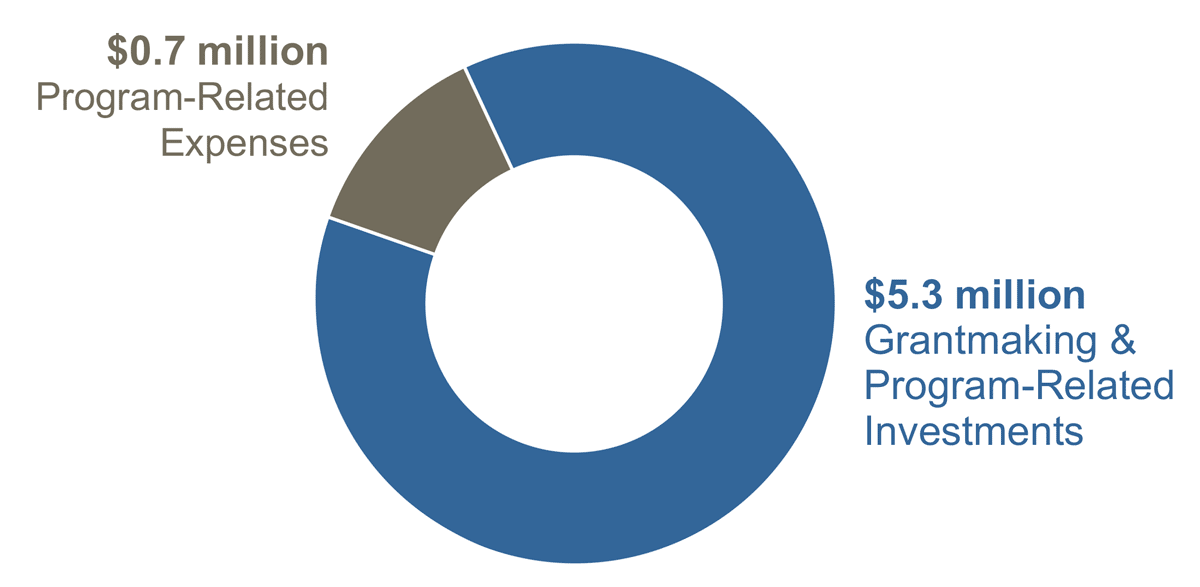
INNOVATOR AWARDS
Grants support an international pool of early-career and seasoned researchers to study untested ideas that could lead to breakthrough discoveries about IBD. View more information about these grants.
Gretchen Diehl, PhD, Baylor College of Medicine
Edward Giles, MD, PhD, Monash University
David Julius, PhD, University of California, San Francisco
Cammie Lesser, PhD, MD, Massachusetts General Hospital
Yan Chun Li, PhD, University of Chicago
Susan Lynch, PhD, University of California, San Francisco
Mark Travis, PhD, University of Manchester
INNOVATOR AWARDS – CONTINUED SUPPORT
Researchers who demonstrate significant progress toward their goals are eligible for additional support of up to two years. View more information about these grants.
Christian Brendel, PhD, Dana-Farber Cancer Institute and Boston Children’s Hospital
Benoit Chassaing, PhD, INSERM
Ajay Chawla, MD, University of California, San Francisco
Marcia Goldberg, MD, Massachusetts General Hospital
Timothy Hand, PhD, University of PIttsburgh
Holly Ingraham, PhD, University of California, San Francisco
Rustem Ismagilov, PhD, California Institute of Technology
Roni Nowarski, PhD, Brigham and Women’s Hospital
Noah Palm, PhD, Yale School of Medicine
Read Pukkila-Worley, MD, FIDSA, University of Massachusetts Medical School
Neal Silverman, PhD, University of Massachusetts Medical School
SYNERGY AWARDS
Grants support teams of researchers who are pursuing collaborative projects aimed at improving the prediction and prevention of Inflammatory Bowel Disease (IBD). View more information about these grants.
Howard Hang, PhD, The Rockefeller University; Ken Cadwell, PhD, Skirball Institute of Biomolecular Medicine and New York University School of Medicine; and Thomas Walz, PhD, The Rockefeller University
Kate Jeffrey, PhD, Massachusetts General Hospital; Naama Geva-Zatorsky, PhD, Technion – Israel Institute of Technology; Irah King, PhD, McGill University; and Corinne Maurice, PhD, McGill University
Randy Longman, MD, PhD, Weill Medical College of Cornell University and Iwijn De Vlaminck, PhD, Cornell University
Thaddeus Stappenbeck, MD, PhD, Cleveland Clinic and Michael Diamond, MD, PhD, Washington University
Hermann Steller, PhD, Rockefeller University; Yaron Fuchs, PhD, Technion – Israel Institute of Technology; and Jeffrey Milsom, MD, Weill Cornell Medical College and New York Presbyterian Hospital
SYNERGY AWARDS – CONTINUED SUPPORT
Research teams who demonstrate significant progress toward their original goals are eligible for up to two years of additional support. View more information about these grants.
Stephan Rogalla, MD, Stanford University; Sarah Streett, MD, Stanford University; Garry Nolan, PhD, Stanford University; and Aaron Mayer, MS, Stanford University
10 STORIES FOR 10 YEARS
A Decade Of Discoveries
The Kenneth Rainin Foundation celebrated 10 years of formal grantmaking in 2019. See the incredible work of our Health grantees and what we’ve learned along the way.
Explore the Foundation’s website to learn more about our Health program.

